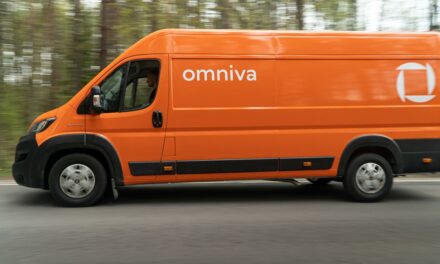
LanChile expands boutique cargo operations to raise returns
Small is beautiful at LanChile.
As LanChile's air cargo business shrinks behind an overall decline in big box operations, the Chilean airline is betting on small package delivery as a way to stay profitable.
Emboldened by last year's stellar performance with profits of US$50 million on $1.4 billion in sales, LanChile aggressively expanded cargo operations. The Chilean carrier has purchased minority stakes in Mexico's MasAir and Florida West International. It has acquired delivery services like SkyNet. And it has unveiled a $60 million state-of-the-art facility at Miami International Airport.
"Cargo was always considered the least glamorous side of the business," explains LanChile CEO Enrique Cueto. "But for us it has always been perhaps the most important part."
With southbound cargo slumping due to economic slides in Brazil and Argentina, the airline is barrel-rolling into specialized services. The company recently restructured to separate passenger and cargo services. "This will be a lost year for aviation," says Armando Valdivieso, general manager of LanChile Cargo. "These are the times when the weak go under and the strong reorganize.
Overall, LanChile's operations posted profits of $20 million during the first half of the year, but the company slipped into the red during the second quarter. In September, LanChile advised analysts to revise estimates due to pilot-induced service disruptions prior to the end of their long-term contract at the end of November 2001 and softening cargo demand.
Now the carrier, like other airlines, will have to scramble again in the wake of the terrorist attacks in the United States, which are expected to hit global aviation hard. "It will have a significant impact on the airline, because while revenues will fall, costs remain the same," says Barbara Angerstein, an analyst with Chilean investment bank Celfin. She notes, however, that the combination of passenger and cargo services has been what has made LanChile more successful than other airlines in Latin America.
The cargo division, which accounts for 40% of the total sales of Chile's leading air carrier, is now targeting tailor-made solutions for corporate clients, small business owners and high-income individuals–a potential market of some 30 million Latin Americans who don't dare receive valuable documents or merchandise via local postal systems. "The Latin American postal services are terrible. Nobody trusts them. They are not an option. If you send a postcard to a girlfriend-maybe," says Rodrigo Gana, an executive who manages package delivery company SkyNet, which was acquired by LanChile in February.
LanChile has launched a barrage of solutions, including LanBox and SkyNet, with the idea of marrying proven services–like a post office box in Miami–with sophisticated tracking software and LanChile's frequent airline flights to the region.
SkyNet (corporate deliveries) and LanBox (personal mailboxes) are off to a flying start. An estimated 60,000 individuals are now using the services regularly while another 50,000 are sporadic customers. Business customers are doubling every five months and personal accounts every two months, according to LanChile executives. Overall revenue for 2001 is expected to top $35 million.
"We have zero marketing. Our best sales force is our clients," says Gana. "We have a huge subscription rate and we don't know where it comes from."
Betting on blue. At the company warehouse outside Miami International Airport, hundreds of orders pour in each morning from Latin American consumers. An unofficial sampling shows Amazon books, replacement parts for machinery and personal mail to be among the most popular options.
Blue chip corporations, including Exxon, Citibank, Apple, HBO and Whirlpool, have signed on to LanChile's services. These companies use SkyNet and LanBox to distribute everything from marketing material to credit cards. J.C. Penney and other U.S. catalogue companies are using the distribution system to target markets in Latin America.
Since the LanChile takeover earlier this year, SkyNet has landed some top accounts. Perhaps the clearest vote of confidence comes from the U.S. Treasury which has turned to LanChile Cargo for its most sensitive exports–freshly minted dollars. In Argentina and even more so in Ecuador, where dollars are the only currency, these high security shipments are encrusted with secret chemical safeguards reminiscent of James Bond. The money is coated with a liquid that dissolves the bills unless the antidote is applied within 24 hours. Says Gana: "If you don't deliver in 24 hours all is lost. It self-destructs. We can't be late."
In more ways than one, LanChile can't afford to delay. Expanding e-commerce business has also created a need for reverse deliveries when clients reject or return a product. This complicated commerce loop requires flexibility, warehouses and improved software–all consumer-friendly services that DHL, Federal Express and United Parcel Service are moving to provide. "The world's biggest companies are trying to resolve this problem in the U.S., Europe, Asia. And as for Latin America? Not yet," says Valdivieso, of LanCargo. "This generates an opportunity for us–before the monsters arrive."
Don't look now, but the 800-pound gorillas of packages are already in the region and expanding. In addition to its traditional express package service, Federal Express launched earlier this year its e-business tools complete with software available in English, Spanish and Portuguese. United Parcel Service has set up a massive $30 million Americas hub in Miami to handle its increasingly heavy loads.
Where LanChile's cargo operations may have a certain advantage is cargo northbound from Chile, which exports a host of perishables including fish, fruits and vegetables. In addition, the airline has effectively gained market share for similar produce from other South America countries thanks to its growing fleet of custom-built 767s with features like separate temperature controlled sections that allow for a variety of products on the same flight. Ecuadoran tuna and prize racehorses, for example, can be shipped on the same plane without defrosting the tuna or freezing the horse. "LanChile's advantage is not only due to the type of products but also how it handles them," says Celfin analyst Angerstein.
By year's end, the company plans to have six 767 freighters. Stretching out payments on these aircraft is key to survival at LanChile, where the company maintains a high debt-to-asset ratio and recently pumped extensive resources into the new Miami cargo facility. The 400,000 square-foot complex is the largest foreign cargo facility in the United States and is almost twice the size of United Parcel Service's new Americas hub at Miami.
LanChile's new facilities are expected to both lower costs and provide clients with a variety of refrigerated space for temperature-sensitive cargos. Fish, fruit and flowers are all kept in separate climates. "The gases from the fruit damage the flowers," explains Valdivieso. "And you can't sell roses which smell like salmon.
To come up smelling like a rose, however, LanChile will have to maneuver deftly with its new "small is beautiful" cargo strategy to avoid entering into a dogfight with the world's top express package companies. Celfin's Angerstein predicts LanChile will avoid any conflict because of the airline's pragmatic track record. "LanChile allied with American Airlines when the time came and I'm sure they would do the same with UPS or Federal Express if it were in its best interest," she says.
Page 58;Volume 9;Issue 11
Latin Trade









